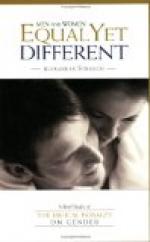The Spartan women were better off than their neighbors; and, in consequence, we get glimpses of a higher type of womanhood. The Spartan mother has furnished a theme for the pen of every ancient Greek historian. Under the Lycurgean system, women were considered “as a part of the State,” and not simply household articles belonging to their husbands—chattels to be disposed of according to the supreme pleasure of their masters. Free women were trained for the service of the State with scarcely less severity than men. Lycurgus remarks: “Female slaves are good enough to sit at home, weaving and spinning; but who can expect a splendid offspring—the appropriate mission and duty of free Spartan women toward their country—from mothers brought up in such occupations?” But though, like the Egyptian women, and indeed in advance of them, the Spartan women were treated with, for the times, a marked degree of attention and respect, still, even in Sparta, there were laws in force by which women suffered grievous injustice. With all the apparent freedom accorded to them, fathers claimed and exercised the right of disposing of their daughters in marriage to suit their own views or interests. Though free-born, a girl had no choice, if her father willed it so, in the selection of her husband; and husbands might, if they wished, dispose of their wives by will, at death, as they would of any other piece of property. Though in a measure free, because she was a woman, she was still a slave.
Among the other infringements of the rights of women, and one of the most barbarous, common to the heathen, both ancient and modern, and to the Mohammedans, is early betrothal. In fact, the system of betrothal prevailed to a very great extent among the very earliest nations of which history furnishes any account, the laws affecting it being only slightly modified to suit the circumstances of the various tribes by which it was adopted. The main feature was still the same—the girl had no choice; there was nothing for her but submission.
The lot of woman in China has, from time immemorial, been a hard one. Says a writer in the Westminster Review for October, 1855: “Of all nations, the Chinese carry out the system of early betrothal most completely; parents in China not only bargain for the marriage of their children during their infancy, but while they are yet unborn. If, when a daughter is betrothed during infancy, the contract should not assume the form of actual sale, it is nevertheless usual for the bridegroom, at the time he acquires possession of the bride, to pay into the hands of her father a sum considered equivalent to the current value of a wife.” Immortality is denied to woman by them. A Christian, intent on the evangelization of the Chinese, spoke to one regarding the salvation of their women. “Women,” replied the Chinaman; “women have no souls. You can’t make Christians of them.” Few persons born in civilized lands, unless brought into




